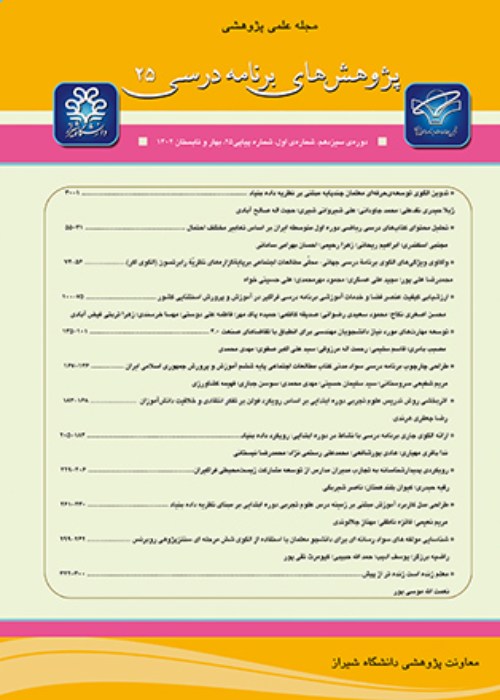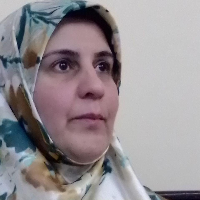Conceptualization of Sex Education Curriculum with an Emphasis on the Roles of Family and School
The purpose of this study was to conceptualize the sex education curriculum with an emphasis on the role of family and school. This research adopted a qualitative approach to develop a grounded theory emerging from the data. A semi-structured interview was used to collect data. The study population consisted of all experts and social and cultural activists, including psychologists, sexual behaviorists, counselors, midwives, educational sciences, law enforcement, sociologists, lawyers, and policymakers, who were active in the areas related to the research topic. Theoretical sampling was used to select the participants, and 32 experts were interviewed. In the first phase of theoretical sampling, 10 experts were interviewed. Then, the initial codes, concepts, and categories, known as substantive codes, were extracted, and open coding continued until the core category, which was the central category accounting for most of the variation in the pattern of behavior, appeared. Afterward, the second phase of sampling was conducted based on the core category. Once the main category was found, selective coding began. During this coding phase, only the concepts related to the main category were coded, and the coding continued until theoretical saturation was reached. Four criteria of fit, work, relevance, and modifiability were used to determine the validity and reliability of findings. Regarding the fit criterion, only the categories emerging from the data were collected, and the researchers intended to take a non-evaluative approach. Core and theoretical codes were also extracted from the participants’ speeches during the interview. Workability means that the categories and the way in which they are related to hypotheses explain the behavior that is occurring in an area of study; that is, workability explains how participants’ main concerns are being continually resolved. In this study, the theoretical codes were derived directly and indirectly from the participants’ quotes. Memos helped to interpret the decisions of individuals or actors in the field. Relevance was achieved when the extracted categories fitted the main concerns of the participants and the developed theory dealt with those main concerns. Modifiability is demonstrated when concepts, their properties, and the substantive theory readily accommodate new data. In the present study, modifiability was achieved by constantly comparing the emerging theory with the data. In fact, the theory was constantly being modified. Findings indicated that, in general, family-based sex education entailed a set of parental interventions related to children, the environment, and teaching and learning special parental skills and goals, such as human excellence, desirable sexual future, and sexual health. These interventions included educational, supervisory-protective, managerial, supportive, social, and moral-spiritual interventions. Parents’ special skills included the acquisition and promotion of sexual knowledge, communication skills, and emotional-attitudinal skills. The two substantive codes of individual differences and interpersonal similarities were the characteristics of family-centered sex education. Parental activism and the educational role of family members and peers were considered kindred activism (substantive code). Furthermore, school-based interventions included educational, supervisory-protective, participatory, cultural-artistic, and scientific interventions. The roles of school staff, including the principals, teachers, counselors, etc., were considered separately. The implementation of school-based sex education was associated with the categories of management-organization, individual factors, participatory factors, ease of implementation, and general action Open codes were further examined and family-based sex education rationale and schoolbased sex education approaches were identified as the core variables. In addition, sex education cultural discourse was identified as the final theoretical code. In other words, it can be stated that the conceptualization of a sex education curriculum depends on the balance between different cultural discourses. By ignoring the concept of sex education cultural discourse, the whole nature of the family-school sex education curriculum loses its function because presently the social context provided for the cultural discourse of sex education dominates all other discourses. However, this discourse is not the dominant discourse in policy-making, the public sphere, and academic contexts in Iran. Sex education is a cultural and social issue, and the roles of family and school in sex education are affected by cultural and social factors. At the same time, the results showed that the roles of family and school were not limited to education. Therefore, decision- and policy-makers at the macro-national level are recommended to pay utmost attention to the cultural discourse of sex education as the most important factor in family and school sex education. To achieve this, all related programs and activities have to be developed in line with maintaining the centrality of familyschool sex education.
- حق عضویت دریافتی صرف حمایت از نشریات عضو و نگهداری، تکمیل و توسعه مگیران میشود.
- پرداخت حق اشتراک و دانلود مقالات اجازه بازنشر آن در سایر رسانههای چاپی و دیجیتال را به کاربر نمیدهد.




